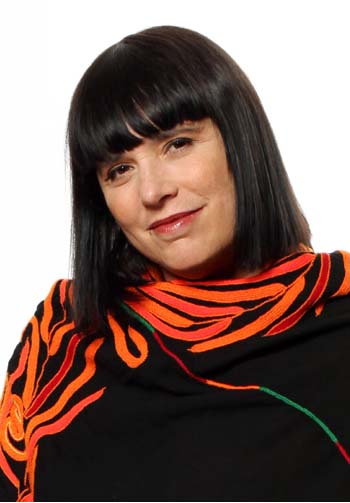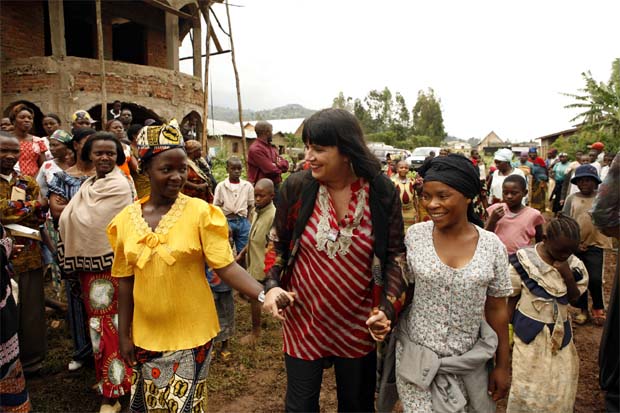Apr 18, 2024
Apr 18, 2024
by S. Shobhana
 'The Vagina Monologues' started as a play and went on to become a colossal V-Day movement that campaigns for better rights for women across the world. Eve Ensler, its playwright and original lead performer was in India recently and spoke about how she, and a global sisterhood of women, has grown along with the continued success of the iconic episodic play.
'The Vagina Monologues' started as a play and went on to become a colossal V-Day movement that campaigns for better rights for women across the world. Eve Ensler, its playwright and original lead performer was in India recently and spoke about how she, and a global sisterhood of women, has grown along with the continued success of the iconic episodic play.
Q: How has 'The Vagina Monologues' brought changes in your life and transformed you over the years?
A: I think when I started doing 'The Vagina Monologues', the violence that had happened in my own life was like a shadow determining my own existence. But then, as I started performing and then leading a global movement, that shadow began to lift. I don't feel like a victim anymore, and I don't think the violence I experienced in my early life is controlling my life anymore. I feel that my hunger for security is over. I don't long for security anymore, I don't even think it's possible, and I'm really okay with it.
Q: How has 'The Vagina Monologues' itself evolved over the years?
A: The play itself hasn't really changed, except that every culture adapts it to make it relevant to itself, whether by changing names or changing what the vagina is called, and this is different in different places, whether India or the Philippines. And every year, I spotlight a particular place and the violence against women prevalent in that place.
Q: What are the different forms that violence can take and how does V-Day address them?
A: V-Day is a movement to end violence against women and girls in all forms, ranging from acid burning to female genital mutilation to rape to domestic battery to incest to sex trafficking. One out of every three women will be beaten or raped in her lifetime and that's true of every single country in the world. It is the hugest epidemic on the planet. And yet, it is the thing nobody wants to deal with. I believe that if we could figure out how to end violence against women and girls, we could change the whole story. Because you can't end violence against women and girls without looking at poverty, racism, the environment - all of this and everything else is connected. And how we treat women and girls, how we feel about women and girls, determines what we feel about life itself, because that's where we come from. V-Day has grown very rapidly in the last 11 years and we are now in 130 countries. This is because of the urgency of the situation and because so many women are violated everywhere.
Q: You have worked in theatre as well as films. What are the differences between the two media, which do you prefer, and why?
A: I am a playwright and I long to be in live theatre. I think the possibility for revolution, change and social action is so strong in live theatre. I am not saying that movies don't have the capability to create that but to me there is something so incredible about live theatre, where you never know what's going to happen next and where you and the audience create the piece together. In film, the piece is already done and you, as the audience, will not change it. In theatre, you are always changing the play because it's a collaboration. But, yes, the HBO television version also had a fantastic impact and being able to show some of the interviews I did, and being able to include more women in the film, was fantastic. I think it broadened the reach of 'The Vagina Monologues'.
Q: What other filmmaking initiatives have you been involved in?
A: I have been involved in several documentaries. 'What I Want My Words To Do To You' is a documentary we made of a group I led at the Bedford Hills facility for women inmates, who had committed violent crimes. It was really a writing group documenting their creative process in coming to terms with the crimes they had committed. We also did a beautiful film about V-Day called 'Until The Violence Stops', and we are working on several other films right now. Hopefully, I am also going to be doing a feature film this summer.
Q: What is 'Insecure At Last', your most recent book, about?
A: It is about insecurity everywhere. I feel this even about being in India right now. We have been searched and our bags have been searched everywhere - it's very strange and I believe the whole world is like that now. It's all about security checks, security clearances and security watches, and I really don't think it is making any of us feel any more secure. In fact, the opposite! 'Insecure At Last' was an attempt to look at, first of all, the fact that total security is ridiculous, it's impossible. We all get old, we all die. There is an obsession with security that is unhealthy. The book was my way of saying, 'Come on into the world of insecurity. That's where we all really live.' What if we drive not so much towards security and instead turn our attention towards love, compassion, towards feeding everybody, and towards care?
Q: Every year a new monologue is added. What was the most recent one?
A: Last year we added a monologue called 'Baptised', which is about the Congo. The worst situation in the world for women today is in the Congo - between two and five hundred thousand women have been raped in the last 12 years in an economic war. I have never seen such atrocities anywhere on the planet.

Six million people have died in the last 12 years and no one seems to know about it. It's really shocking. I think it has to do with colonialism, racism and these bizarre expectations that are had about Africa. We just tend to assume these things happen there. But now, having spent a lot of time there, I have met extraordinary women and we have done some extraordinary work there. We are building a massive campaign and opening a place called the City of Joy, which will be a city for women survivors, who will turn their pain to power, and who will really work to become the next leaders of the DRC (Democratic Republic of Congo).
Q: Where, to your mind, has the best performance of 'The Vagina Monologues' taken place until now?
A: I saw a production that Pakistani women - they were all in a red shalwar-kameez - performed for Afghan women in Islamabad. That wasemotional, mind-blowing and beautiful. I saw another production by Bosnian girls in a town where many girls had been raped. It was really extraordinary.
Q: Is the pen mightier than the sword?
A: I have always believed that if you can write something, you can transform things. For me, I know I would have been in a mental institution or dead a long time ago if I couldn't write. My own childhood was way too violent and then, travelling the world and seeing so much suffering, if I couldn't find a way to translate that into writing, I don't know that I would have survived. I also look at 'The Vagina Monologues' and see that plays can move people into action and transformation, and that's very, very exciting to me.
06-Dec-2009
More by : S. Shobhana